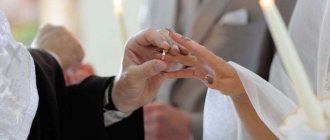Muslims, like no other people, honor their traditions. For how many centuries now, traditions regarding the wedding ceremony have remained unchanged. The Koran says that the main commandment of a Muslim is to create a strong, lasting and happy family.
A Muslim wedding, as they call it.
To this day, this commandment is sacredly revered and observed. Muslims have a special wedding ceremony. It is called nikah.
Nikah
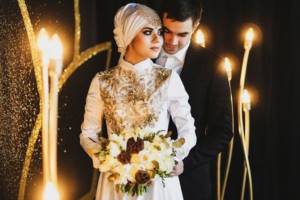
In modern society, the fact of performing nikah is confirmed by a document that has no legal force. Despite this, Muslims continue to sacredly honor and observe the customs of their ancestors.
Nikah is a ritual prescribed by Sharia (a set of rules concerning the life of Muslims, based on observance of the Koran). It symbolizes the sacred marriage between a man and a woman. Its essence is not only in acquiring the right to legal family relationships, living together, living and having children, but also in taking mutual obligations.
They are seriously preparing for nikah. First of all, the newlyweds inform their parents of their intention to get married in order to receive their blessing. Long before the wedding ceremony, future spouses discuss the most important moments of their life together and their expectations from each other. Thus, a girl can warn her future husband that she intends to get an education, and only after that consider having children.
Muslims are confident that all important issues, even the most intimate ones, should be discussed before marriage in order to get rid of unpleasant surprises in the future. Modern youth do not consider it immodest to come to their nikah with a marriage contract in their hands, which is read out during the ceremony in front of witnesses, in the presence of a clergyman.

Conditions for Nikah
In Islam, there are clear regulations on the rules and conditions for entering into a religious marriage:
- nikah is concluded solely by mutual consent of a man and a woman;
- future spouses must reach marriageable age;
- it is unacceptable for them to be closely related;
- At the ceremony, the presence of a man from among the bride’s closest relatives is required, acting as a guardian: father, brother or uncle. When this is not possible, other adult Muslim men are invited;
- the ceremony always takes place in the presence of male witnesses from each of the future spouses;
- The groom must certainly pay mahr (money as a wedding gift) to the bride. The amount depends on her wishes. Modern Muslims often replace money with expensive jewelry, valuable property or real estate.
Interesting! According to Islamic tradition, the mahr should not be excessive or too small.
The conditions for concluding a nikah are in many ways similar to those that are customarily observed during secular marriage registration. This means that they have stood the test of time and have repeatedly confirmed their worth.
Stages of a Muslim wedding
The Muslim wedding ceremony begins long before the official registration of marriage. Currently, it takes place taking into account all customs and traditions. In fact, it is very interesting to attend such a ceremony, because only then can you feel the national flavor.
The wedding takes place in several important stages, which follow each other in strict order:
- Request for marriage - a guy and a girl, even if they are in love with each other, are forbidden to be alone. A guy who wants to marry a beautiful young lady should initially ask his older relative for advice. It could be a brother or an uncle. If the eldest relative gives the go-ahead, then he goes to the eldest married relative of the bride and asks her if they want to marry the young lady off. If the woman gives a positive answer, then they begin to discuss the date and time of matchmaking.
- The groom and his relatives come to the bride’s house for the matchmaking ceremony. During the conversation, the desire to marry the girl is discussed and consent is taken from her parents. If families agree on a speedy marriage, then the date of the wedding itself is soon set. It is noteworthy that the groom’s side takes on all organizational and financial issues. From the bride's side there will be only a beautiful young lady, who in herself is already a treasure.
- Before the wedding itself, many Muslim nations have a unique ritual that has much in common with hen and stag parties. It is the only place where young people gather and spend their unmarried lives. The girls sing songs, and the men go to the bathhouse.
- Nikah is an important ritual that is considered one of the main ones at Muslim weddings. Before officially registering your relationship, you need to get married. This ceremony is performed by a mullah. Only the parents of the newlyweds and their witnesses can enter the mosque. In this case, two men must be witnesses. If you still want to choose from women, then you should understand that the Muslim rule equates one man to two women. Accordingly, instead of one male witness, it will be necessary to bring two women. Nikah is a ceremony very similar to a wedding in Islam. During it, guests read prayers and ask Allah for a better life for the young family.
- Official registration of marriage - for which the newlyweds are sent to the registry office, where they are signed according to their mutual desire and consent.
- Wedding banquet - often held in the home of the bride or groom. Although nowadays banquet halls have become increasingly popular.
Ideal wife for a Muslim
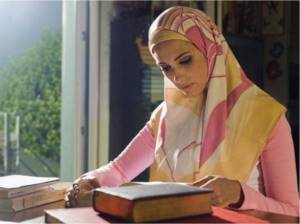
- was healthy and pious;
- received a highly moral education;
- well versed in issues of the Islamic religion.
It is desirable that she is also beautiful and rich. However, the faithful respect the Prophet’s warnings that it is wrong to make a woman’s external attractiveness and her level of income the main criteria. The Prophet warned that external beauty could in the future have a detrimental effect on spiritual qualities, and wealth could cause disobedience.
The criteria for choosing a future wife are based on the goals of creating a family , because marriage is concluded for:
- creating a harmonious union of loving people;
- birth and proper upbringing of children.
From this point of view, the parameters that Muslim men use when choosing a life partner look quite logical.
Nikah between a Christian and a Muslim woman
In the Philosophy, Unknown section, the question is whether a Russian baptized person can do NIKAH if he marries a Muslim woman. what consequences of this may be asked by the author Irrigate the best answer is You know, when we are talking about marriage between a Christian and a Muslim woman, we can safely read “between a formally Christian and a formally Christian woman.” And in this case, does it really matter? As they say, as long as they live in love and harmony. Of course, both nikah and wedding are possible (if representatives of both clergy agree). I assume that we are talking about the Orthodox confession, so I will give an answer to a similar question from the site “We live in Bashkortostan, and, naturally, we are faced with situations such as Muslim funerals, wedding ceremonies - “Nikah” and so on. In this case, you have to be present in the mosque or in their home when the mullah reads the sura (prayer). Is this a sin for Orthodox Christians? ..In addition, marriages often take place between Christians and Muslims. Such husband and wife, as a rule, read Nikah, or simply limit themselves to registering at the registry office. Is this a sin for an Orthodox Christian? "" Dear Evgeniy and Irina! An Orthodox Christian should not be present at such rituals and, of course, there cannot be a church consecration of a union of people belonging to different religions. A marriage between an Orthodox Christian and a Muslim, which would be sanctified by the Church, cannot happen. An Orthodox Christian or Christian woman, for whom faith is the main thing in life, no matter how strong his feeling, will not marry a person with different ideas about God and the Church. “Marriage is a sacrament in which the marital union is blessed, in the image of the spiritual union of Christ with the Church, and the grace of pure unanimity is asked for the blessed birth and Christian upbringing of children” (Orthodox Catechism). Of course, there can be no talk of any unanimity or the creation of a small church in marriage with non-believers. Before Peter I, marriages between Orthodox and non-Orthodox were not allowed. In 1720, for state reasons, permission was granted to marry Catholics and Lutherans, that is, heterodox, not non-Orthodox. This law remained in force throughout the synodal period. Here the point is in those fundamental problems that arise along with the main consequence of marriage - the birth and upbringing of children. How to divide children - raise a son as a Muslim and a daughter as a Christian? By lot? By who is stronger in his beliefs? Yes, belonging to another faith does not necessarily mean a lack of love and understanding in the family. But, however, this gives much less reason to hope that love and understanding will be achieved, because the stock of common things, the stock of what people together accept as axioms is much greater than, say, between a believer and an unbeliever, a Christian and a Jew. So there will be more hope for a good family. The Church is very wary and skeptical about such marriages. And this is not at all a manifestation of cruelty or narrow-mindedness. This is centuries-old experience and a sincere desire to keep young people from making mistakes. By the way, according to statistics in the United States, for example, there are three times more divorces between interreligious marriages than among marriages of co-religionists. And children raised in two, sometimes diametrically opposed, scales of values, not to mention traditions and customs, inevitably suffer irreparable spiritual losses. However, our point of view cannot be hateful towards other faiths, but on the contrary, we should all treat every person with attention and kindness, despite his religious views.” (This is the opinion of an Orthodox priest, not mine).
Henna night

According to tradition, the gathered women sing sad songs, and the bride cries. It is generally accepted that the more tears shed that night, the more successful and happier the upcoming marriage will be. In former times, marriage really gave reason for crying, because the young woman was separated from her family for a long time (sometimes forever). She was worried about moving to her fiancé's family, whom she might not even know.
A lot has changed now. The brides are no longer sad, but openly rejoice, singing and dancing. Often, “henna night” takes place in a restaurant with cheerful music, and competitions are held for the bride and her bridesmaids.
The traditional Muslim ritual opens with the “lighting of henna.” The groom's mother brings in a beautiful tray with henna and burning candles. This symbolizes the ardent mutual love of the future newlyweds. The bride's friends and relatives are present at the event - dressed up, with beautiful hairstyles. The hero of the occasion, as expected, is dressed in a luxurious red dress, and her head is covered with an elegant red veil. Guests sing songs and dance.
The future mother-in-law places a gold coin in the palm of her son's bride and holds it tightly. At this moment the girl must make a wish. The hand is painted with henna and a special red bag is placed on it.
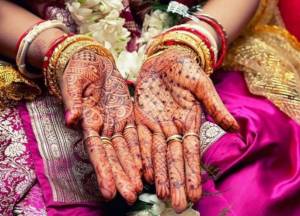
Bottom line
A Muslim wedding is a beautiful custom that is honored by every generation of Muslims. Young people firmly believe that nikah will allow a young family to lead a happy and long family life. Muslim marriages without nikah cannot be recognized in their homeland.
Many couples go to their homeland specifically for the wedding. Of course, every nationality has differences in the ceremony. But they are united by one thing - reverence for Allah and faith in holy traditions that are passed on from generation to generation. Only their observance will mark the beginning of a new happy life.
https://www.instagram.com/p/Bp3imvLF-lI/
Spiritual Guidelines of Islam
The nikah ceremony can take place in any language. The main thing is that the bride, groom and witnesses understand the meaning of what was said and what is happening.
At the beginning of the ceremony, the mullah reads a sermon:
- about the meaning of marriage and the mutual responsibility of spouses to each other;
- about the importance of decent upbringing of offspring.
Traditionally, during the ceremony, a relative of the bride asks her consent to marry. At the same time, the bride’s silence does not mean that she objects. Spiritual traditions allow that, being a virgin, the future wife may simply be embarrassed to express her “yes” out loud.
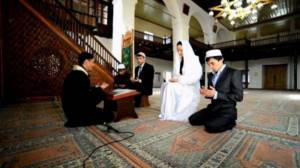
Important! In accordance with spiritual tradition, it is recommended to end the nikah with a celebration, to which many guests are invited and abundant food is served.
For Muslims, weddings are not just a beautiful custom. In accordance with the wills of the Prophet, men who have the opportunity and desire to marry must do so. The concept of “opportunity” includes:
- normal physical and mental health;
- awareness of moral responsibility for the family and willingness to accept it;
- the required level of material security;
- literacy in matters of religion.
Muslims, not without reason, believe that compliance with these rules is an indispensable condition for happiness and harmony in marriage.
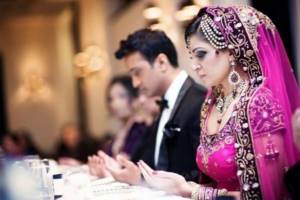
How nikah, Muslim marriage is performed
Muslim nikkah is a wedding ceremony that resembles the wedding of Christian peoples. Traditionally, the nikah is held at the bride's house. A local imam is invited to conclude the nikah. Also these days, nikah is held in a cafe, restaurant or even in a mosque, but mostly the imam (mullah) is invited home. However, Muslim marriage has its own rules (conditions).
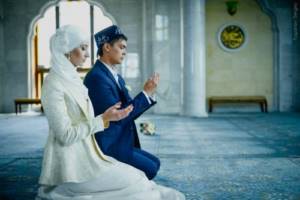
Conditions for concluding nikah
1. In addition to the Muslim cleric, two male witnesses must be present. If there are no two men, then it is allowed to appoint one man and two women. Witnesses must be Muslim.
2. The bride and groom must be Muslim. Usually the imam asks them, in front of witnesses and guests, to pronounce the Muslim formula of monotheism “Laya Ilaha illallah, Muhammad rasulullah” (meaning: There is no God except the One God Allah and that Muhammad is the messenger of God), by which they prove their faith in the One God - Allah.
3. The groom must give mahar (gift to the bride). Usually they give gold jewelry (earrings, chain, ring, etc.). The imam asks the groom to show the mahar (gift) to witnesses, guests and give it to his daughter-in-law.
4.Both must agree to the marriage. During the act, a proposal and an answer are pronounced. For example, the mullah first asks the bride’s consent:
- By order of our creator Allah Subhanak wa Tagal and according to the sunnat of our prophet Mr. Muhammad sallallahu alayhi wasallam, you Amina, the daughter of Ilyas, by your consent married Abdullah the son of Ali.
The bride answers:
- Yes, I married him by my own consent.
Next, the imam asks the groom:
- Abdullah son of Ali, by order of our creator Allah Subhanak wa Tagal and according to the sunnat of our prophet Mr. Muhammad sallallahu alayhi wasallam, did you, with your consent, take Ilyas’s daughter Amina as your wife?
The groom answers:
- Yes, I took her by my own consent.
According to the madhhab of Abu Hanifa, the question is asked in the past tense and therefore the answer should also be the same. After receiving answers in front of witnesses, the young people are considered husband and wife. Nikah is considered concluded. After this, the imam begins to read the nikah khutbah and makes dua (prayer) for the newlyweds.
Now we understand that the main condition for nikah is compliance with all the above rules. Namely, the mullah’s verification of compliance with all these conditions in front of witnesses is the conclusion of the nikah. Many are mistaken in thinking that nikah is a ceremony where a mullah reads a prayer in front of the newlyweds and after that they are considered husband and wife. No, nikah is the conclusion of an agreement before the witnesses and the main witness, the Almighty, by checking compliance with the mandatory conditions (rules), and not so that the mullah reads the prayer and all matters.
Nikah between a Muslim and a Christian or Jewish woman is permitted, but the man is obliged to call his wife to Islam while living together. Nikah is not allowed between a Muslim and an atheist (non-believer in God) woman.
Nikah between a Muslim woman and a Christian or a follower of another religion, as well as an atheist, is prohibited. A Muslim woman has the right to marry only a man of her faith (only a Muslim). The only exception is if the groom voluntarily converts to Islam.
Nikah between two holidays and during Uraza
There is an opinion among people that nikah cannot be concluded between two holidays (Ides). This is a misconception. Nikah can be read on any day of the year. And during uraza (fasting), it is not very convenient to celebrate, since you cannot eat or drink during the day. Even if people do not fast, still, for the sake of respect for the month of Ramadan, it is impossible to hold a banquet or feast during the day. If necessary, you can conclude a nikkah during the day without a feast, or organize a small banquet in the evening during iftar (breaking the fast).
And you can also read nikkah on the day of Eid al-Adha or Kurban Bayram, but on this day the clergy are busy holding the holiday in mosques and this can create inconvenience for them. Therefore, it is necessary to discuss everything with them in advance.
What dua does the bride and groom read at nikah?
Many newlyweds are interested in what dua should be read during nikah. We look above the section of the rule for concluding nikah, point two, and we see that the young people must pronounce the shahadah: “Laya Ilyaha Illallah. Muhammad rasulullah" (short version), or another option: "Ashkhadu alla Ilyaha ilallah, Ashkhadu anna Muhammadan abduhu wa rasululah."
Nikah with a Christian woman
Islam does not prohibit Muslim men from marrying Christian and Jewish women. At the same time, a woman is not obliged to change her faith, and forcing her to do so is considered a sin. However, it is advisable for family members to adhere to the same religion in the future. This will allow you to avoid many disagreements when living together, including in matters of raising children.
Nikah with a girl of a different faith is carried out in compliance with all traditions, but there are a number of features:
- witnesses on the part of the bride must be Muslims, since the presence of representatives of other religions during the ceremony is unacceptable;
- the girl must be dressed in accordance with Islamic rules;
- When performing nikah, the bride says a special prayer - shahada - and receives a second (Muslim) name.
Interesting! Islamic women are only allowed to marry Muslims. They can start a family with representatives of other faiths only if the future husband converts to Islam.
Ceremony in the mosque

Fees
It all starts with the fact that each of the future spouses, while still at home, completely washes their body and puts on formal attire. In this case, the bride’s dress is long, closed and not tight-fitting, and the headdress (veil or scarf) completely covers the hair. For this reason, Muslim brides are spared the need to spend long hours at the hairdresser on the eve of the ceremony.
As for the groom's suit, modern men do not attach special importance to it, often choosing the usual “two-piece”. Recently, there has been a tendency to order a special frock coat, which is paired with classic trousers and shoes.
A prayer is offered in the parental home, the newlyweds ask and receive the blessings of their father and mother, after which the bride and groom, each accompanied by their parents, go to the ceremony. Traditionally, the nikah ceremony takes place in a mosque, but it is not forbidden to get married at home, where a representative of the clergy is specially invited.
Ceremony
The ceremony begins with a sermon given by a mullah or imam.

Further:
- prayers follow for the happiness and well-being of the new family;
- the mahr is voiced, which the girl often receives right there;
- the groom prays for the good of his future wife and her protection from evil forces.
Having received mutual consent from the newlyweds, the mullah announces the marriage, after which the spouses exchange wedding rings. At the end of the ceremony they are given a special certificate.
Rings
Important! According to Sharia rules, Muslim wedding rings must be only silver, without precious stones. For men, this condition is still mandatory today, but women are allowed gold.
Jewelry companies offer a variety of wedding rings for nikah, the main decoration of which are words and phrases praising Allah. They can be inscribed on both the internal and external surfaces of the decoration. Small, “modest” diamonds are increasingly sparkling on women’s rings.
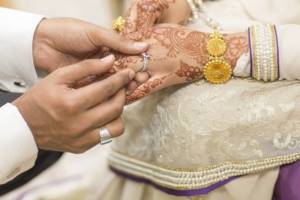
Banquet in Muslim style
After the wedding ceremony, the newlyweds and their guests go to a gala dinner. Wedding tables are set abundantly and variedly. To create a special atmosphere of celebration, musicians are invited to the event. People are having fun and dancing.
It is allowed to invite friends and relatives to the wedding banquet, regardless of religion. Before the start of the feast, guests present gifts to the newlyweds. Most gifts given are money, special gold coins and expensive jewelry.
According to Muslim tradition, there should be no alcohol or pork on the table. But sweets, fruits, juices and popular carbonated drinks are welcome. At the end of the festive dinner, the newly made husband and wife leave for home.
Entertainment for guests
The Tatar people are very hospitable and generous, so the event is carefully thought out. The event organizers entertain the guests present for several days. The celebration is filled with dancing, competitions, jokes, and playing original musical instruments, which include the talyan, kurai, mandolin and dombra.
Muslim laws do not allow drinking alcoholic beverages at a wedding. At the end of lunch, guests are usually offered tea, sweet dishes and dessert.
Drinking alcohol is especially prohibited during the sacred Nikah ritual. If anyone present violates the ban, the ritual is declared invalid.









